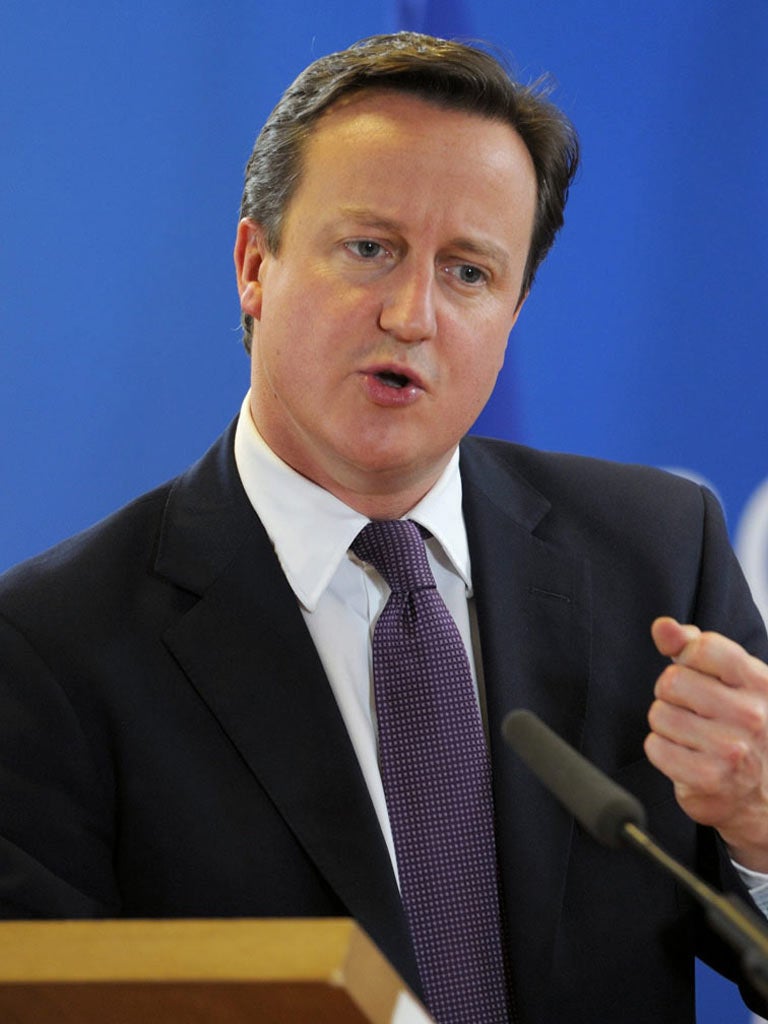Your support helps us to tell the story
From reproductive rights to climate change to Big Tech, The Independent is on the ground when the story is developing. Whether it's investigating the financials of Elon Musk's pro-Trump PAC or producing our latest documentary, 'The A Word', which shines a light on the American women fighting for reproductive rights, we know how important it is to parse out the facts from the messaging.
At such a critical moment in US history, we need reporters on the ground. Your donation allows us to keep sending journalists to speak to both sides of the story.
The Independent is trusted by Americans across the entire political spectrum. And unlike many other quality news outlets, we choose not to lock Americans out of our reporting and analysis with paywalls. We believe quality journalism should be available to everyone, paid for by those who can afford it.
Your support makes all the difference.The position put forward by David Cameron in Brussels was quite simply non-negotiable. If Cameron didn't know this, it was due to inattention, for he is not stupid.
By far the most likely explanation for his public volte-face is political. On Monday and Tuesday of last week, he appeared to be a negotiator and yet by Wednesday and Thursday he had developed an ultimatum mood. To anyone listening to his change of tone, it was clear he was faced by a group of 80 to 100 Conservative MPs who would not live with an EU treaty including legislation for the eurozone different to that which already exists.
Far from being bold and decisive, Cameron appeased that element in his party that has long wanted Britain not only to exclude itself from the eurozone but who want to leave the EU altogether.
In doing so, Cameron broke from a negotiating process of constructive engagement and thus rejected the collective wisdom of his predecessors. In 1978 Jim Callaghan decided to join the European Monetary System but not to join the Exchange Rate Mechanism. In 1990 John Major decided to be party to the European Monetary Union but not to join the eurozone. These were decisions taken on grounds of practical prudence. Experience of the EU had shown many people that the empty chair was not the way to win the argument.
The strange development was that Nick Clegg apparently accepted the non-negotiable document but presumably had no inkling of how these demands would be presented. Cameron, having got Clegg on board, appears to have thought that was sufficient. And Clegg gave the message of support all through Friday and most of Saturday. By yesterday, when Clegg became a dissenter, Cameron had no reason to fear the Coalition would break up. As over the Alternative Vote, Cameron's position toughened as the moment for decision came, and he once again ruthlessly pushed Clegg into a blind alley.
But this will prove to be a serious miscalculation by Cameron. For he has revealed the faultline in the Coalition. It may take some months before that becomes a chasm, but his high-handed approach makes it very likely that before the end of 2012, we will see in the Commons a no-confidence motion tabled by the Opposition, which will win the support of some Liberal Democrats.
Under the rules of the fixed-term Parliaments which the Coalition passed, there have to be two votes of no confidence, which must be won within a fortnight, for the Coalition to fall and the Government to be automatically replaced. Maybe such an outcome will not materialise in 2012, but it surely will by 2013, when a combination of low economic growth and massive unpopularity will bring about the the Coalition's collapse.
The Conservatives don't seem to understand that the Prime Minister no longer has the right to ask the Queen for a general election. An election can only take place before 2015 if Conservative and Labour MPs vote for a dissolution, since the Coalition and smaller parties cannot make up the required percentage.
In their defence, Conservatives say the PM was safeguarding the City. Would that he were. But the City depends on business from the EU member states, and pretending that we can ignore their input into the regulation of the City is obsessive and blind.
For Cameron to try to reintroduce the argument for unanimous voting and the abandonment of qualified majority voting – which even Margaret Thatcher accepted – in areas of British interest was always going to be a major issue. Yet, it would have been possible to negotiate if the ground had been well-prepared diplomatically, and in a mood of constructive negotiation. It was never going to be agreed after a breakdown in relationships, not just with President Sarkozy, but, far more importantly, with Chancellor Merkel.
If any City punters rejoiced on Friday, thinking they can be safeguarded by a Britain that relishes being on its own, they will soon feel it in their own pockets.
Lord Owen was leader of the Social Democratic Party from 1983-1990

Join our commenting forum
Join thought-provoking conversations, follow other Independent readers and see their replies
Comments